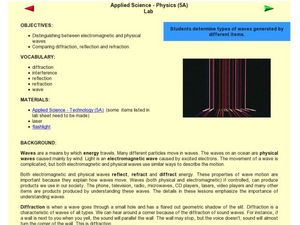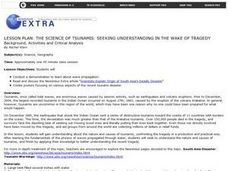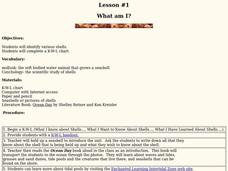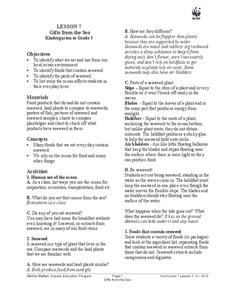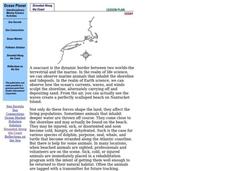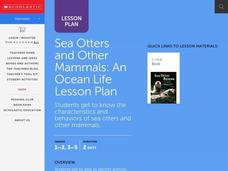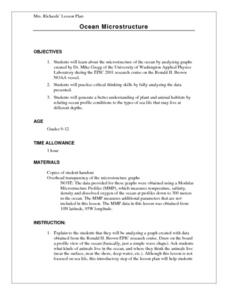Columbus City Schools
Making Waves
Learning about waves can have its ups and downs, but a demo-packed tool kit has the class "standing" for more! Learners gain experience with several different wave types, organizing observations and data, and wave...
Curated OER
Motion in the Ocean
How does the formation of currents and waves in the ocean happen? High schoolers will learn about the primary causes for ocean currents and waves by calculating a wave's amplitude and nautical mile speed. Then they will complete a...
Columbus City Schools
Totally Tides
Surf's up, big kahunas! How do surfers know when the big waves will appear? They use science! Over the course of five days, dive in to the inner workings of tidal waves and learn to predict sea levels with the moon as your guide.
Curated OER
Properties of the Ocean
Students participate in a problem-solving activity, that includes Internet research, about how energies such as currents, waves, tides, etc. affect the ocean.
Curated OER
Fetch Me a Wave
Students explore waves and how they form. In this wave lesson students prepare a written report on waves and tsunamis then discuss what they learned.
Curated OER
Electromagnetic and Physical Waves
Students compare and contrast electromagnetic and physical waves. In this wave lesson plan, students discover that all waves reflect, refract, and diffract energy. Students work in small groups to experiment with waves and evaluate the...
Curated OER
Ocean Currents and Sea Surface Temperature
Students use satellite data to explore sea surface temperature. They explore the relationship between the rotation of the Earth, the path of ocean current and air pressure centers. After studying maps of sea surface temperature and ocean...
Curated OER
The Science of Tsunamis: Seeking Understanding in the Wake of Tragedy
Students use Internet research, articles, discussion and models to explore the dynamics of a tsunami. They focus on the 2004 Asian Tsunami and create posters illustrating their understanding of this phenomenon.
Curated OER
Ocean Currents
Fourth graders work in groups to research ocean currents and create posters with their findings. They locate the patterns and names of major ocean currents and identify them on a map. Students also use red pencil to show ocean currents...
NOAA
Journey to the Unknown
What's it like to be a deep-sea explorer? Tap into the imaginations of your fifth and sixth graders with a vivid instructional activity, the second part of a six-part adventure. Learners close their eyes and submerge themselves in an...
Curated OER
Science and the Ocean Ranger Disaster
Students investigate the scientific theories behind various elements of the Ocean Ranger disaster. They present their information in a format of their choosing.
Curated OER
Salinity
Students take a provided ocean Trivia Quiz in order to start a discussion of the ocean. They then perform an experiment on how the amount of salt in the ocean affects it and varies from ocean to ocean.
Curated OER
What Am I?
Young scholars identify various shells. In this oceanography lesson, students create a KWL chart to activate background knowledge on shells. Young scholars read the book Ocean Day and learn about waves, tides, and the seashells that can...
Curated OER
Weather Anomalies
Ninth graders participate in a simulation of a select scientific team from the National Oceanic and Atmospheric Administration (NOAA).
Curated OER
Gifts from the Sea
Students discover the oceanic food chain. In this healthy eating lesson, student investigate the fish we eat and the food the fish eat. Students discover what ocean animals eat seaweed and what everyday foods we eat that also...
Curated OER
Stranded Along The Coast
Students reflect and investigate how a seacoast is the dynamic border between two worlds-the terrestrial and the marine. In the realm of life science, we can observe marine animals that inhabit the shoreline and tidepools. In the realm...
Curated OER
Tsunamis
Students investigate the natural disasters known as tsunamis by researching the Internet. In this nature lesson, students define the word tsunami and discuss how they are created. Students complete an online activity based on...
Curated OER
Ocean Life
Students identify marine mammals according to specific characteristics. Students read about marine mammals and list their characteristics. Next, students play a Whale and Otter game on the playground to simulate whales swimming across...
Curated OER
Tsunamis by the Book
Students use the Internet and other sources to investigate tsunamis. They construct books listing several tsunami facts and cite their sources. They read their books to another class.
Curated OER
Ocean Microstructure
Students assess the ocean's microstructure by analyzing graphs created during tne Ronald H.Brown research cruise. they discuss at what depths various sea animals live and write paragraphs on data analysis from the graphs.
Curated OER
What Are The Properties of Sea Water?
Ninth graders conduct research on the subject of sea water. They use a variety of resources to obtain information. There are helpful resource links listed in the activity. In conjunction with the research students make inquiry of the...
Curated OER
CO2 and Air Pollution
Seventh graders observe and test for the presence of carbon dioxide gas. They compare concentrations of carbon dioxide gas and conclude high concentrations of carbon dioxide gas are unhealthy for human beings.
Curated OER
Estuarine Currents
Students explore an estuarine system to gather data on density driven currents. This type of current is contrasted with temperature and wind driven currents.
Curated OER
Estuaries, Estuarine Habitats, and Adaptations
Students conduct research on estuaries. They design and construct an estuary, describe the physical characteristics of an estuary, and create a diagram illustrating an estuarine food web.





